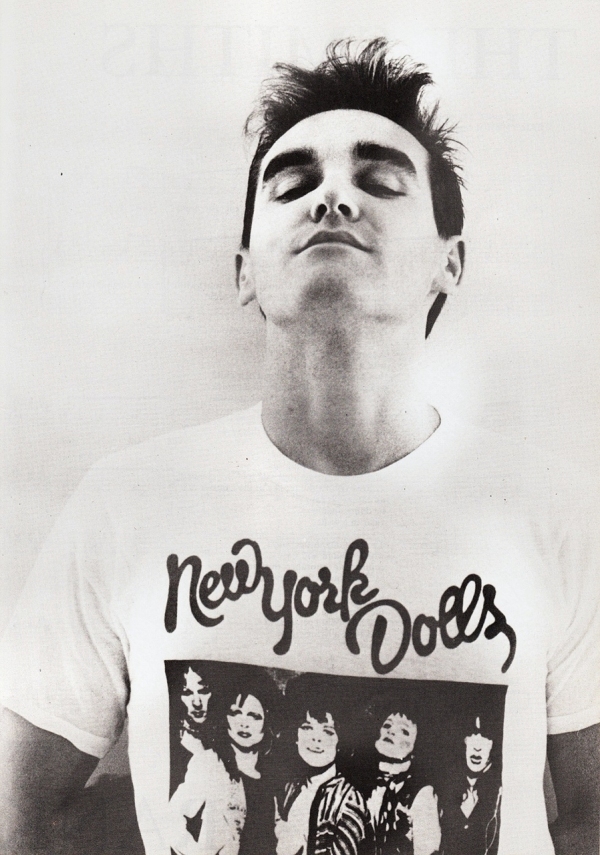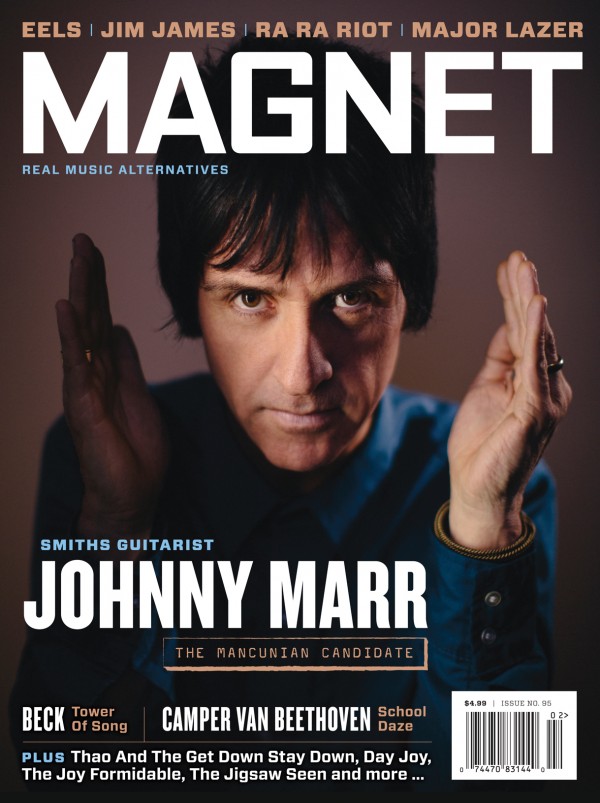For the deeply devoted—and they are legion—there are but two periods in the history of mankind: The time Before Smiths and the time After Smiths. The years B.S. ended in Manchester one May afternoon in 1982, when Johnny Marr—his rockabilly quiff stacked high and retro, Brando-esque Levis cuffed just right—ambled up to 384 Kings Road and knocked on the door. One Steven Patrick Morrissey, unemployable bookworm homebody, who at the ripe old age of 22 was beginning to get the distinct feeling that life had passed him by, answered the door. Marr did not bother with the inane niceties of small talk, and told Morrissey, in so many words, that he was starting a band, it was going to change the world, and you are going to be the lead singer. In that case, you had better come inside, Morrissey said. Years later, after he’d been ensconced as the poet laureate of a lost generation, Morrissey would say he had expected something like this all along, that for years on end he sat vigil in his bedsit sanctum in his mother’s house waiting for destiny to knock on his door.
And so it had.
They went up to Morrissey’s bedroom, which was wallpapered with floor-to-ceiling shelves heaving with books, and all roads seemed to lead to a typewriter on a desk. A failed rock critic, Morrissey had taken to writing poetry as of late. They bonded immediately over a shared love of ’60s girl groups like the Shirelles, the Crystals and the Shangri-Las. “There was so much yearning in those records,” Johnny Marr told me. “They had a great sound, there was a real magic and exuberance about them. Phil Spector’s production work had a gothic intensity. He created these three-minute explosions of sound. It was these mini-symphonies sung by teenagers in Brooklyn and Queens, and each one made a statement. It meant more to me than whatever tired shit was going around in the U.K. in 1982. I wanted to make records that had that kind of intensity. I thought that Morrissey was the only other person who liked the kind of music I liked for the same reasons I did. There is an understanding there, you know?” The next time, they met at Marr’s house. Up in his attic bedroom, they sorted out the truly important things—the color of the label on their first single (blue), the record company they were going to sign with (Rough Trade)—and then they started writing songs. Thus setting into motion a decades-long series of events culminating with the arrival of Morrissey at the Academy of Music on Saturday. Some tickets remain. Shoplifters of The World Unite!
MORRISSEY PERFORMS @ THE ACADEMY OF MUSIC ON SATURDAY JUNE 20TH
_________________
EXCERPT: The Importance Of Being Johnny Marr
BY JONATHAN VALANIA FOR MAGNET MAGAZINE Being Johnny Marr is nice work if you can get it. Lots of travel, flexible hours, money for nothing, chicks for free. Most days you walk between the raindrops. You are rakishly handsome, impossibly talented, effortlessly cool and beloved by all. Born in Manchester and raised in public housing, you meet your soulmate when you were 14, you quit school when you were 15, and at the ripe old age of 18 you start a band that NME readers will, 20 years hence, declare the most important band of the last 50 years, edging out the Beatles and the Rolling Stones. Small wonder everyone wants you to join their band in the studio or onstage for a song or a tour, or even an album or two: the Talking Heads, the Pretenders, Modest Mouse, R.E.M., Beck, Oasis, Bryan Ferry, Pet Shop Boys, Billy Bragg, Black Grape, Jane Birkin, Happy Mondays, The The, Chic, Dinosaur Jr, Pearl Jam, Crowded House, Tom Jones and, last but not least, the guy who started Joy Division. You almost never say no, because you are not just a legend, you are also a nice guy.
Here you are, a year shy of 50. You still have the soulmate, two grown children, your looks and all your hair, plus a line of Fender Jaguars named after you, along with a numbered limited edition of Johnny Marr Ray-Ban Signet sunglasses with light blue-tinted lenses and gunmetal frame. And, best of all, 25 years after walking away from your own band, you are finally going solo. “The ideas became stronger to me and the well filled up—that’s the right time to do it,” Marr says when asked what took so long. “It was pretty much all there before I started to work with it.” The album is called The Messenger and it is easily your best work since the Smiths, some of it is clearly as good as the Smiths and some of it, arguably, is better than the Smiths.
Ah yes, the Smiths. Before we go any further, let’s just get this out of the way: The Smiths will not be reuniting. Not now, not ever. Not that I didn’t try to make it happen, but the sad reality is when the queen is dead, she stays dead. A full Beatles reunion is more likely. Or, to quote Morrissey’s publicist, “The Smiths are never, ever, ever, ever, ever, ever, ever, ever going to reunite—ever.” And if the more determined among you can parse that quote for a glimmer of hope that there’s still an outside chance of a reunion, please note that there’s eight “ever”s in that statement, meaning eight eternities in a row that will have to run their course before a Smiths reunion comes to pass. Given that the median age of the members of the Smiths is 50, and the life expectancy for British males is currently 78.2 years, it doesn’t look good. MORE


